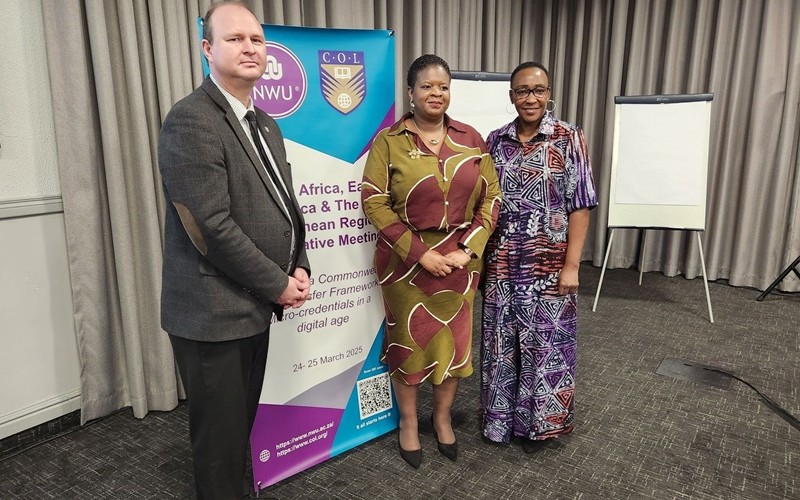
As part of the Commonwealth of Learning’s (COL) Developing a Commonwealth Credit Transfer Framework: Micro-credentials in a Digital Age project, a regional consultation meeting recently took place in Johannesburg, South Africa, for the Southern Africa, Eastern Africa and Mediterranean regions.
The regional meeting, co-hosted by COL and the North-West University, South Africa, brought together representatives from ministries, government departments, and post-secondary institutions to engage on existing credit transfer and micro-credentialing policies and practices across the Commonwealth. According to Dr Jako Olivier, COL’s Adviser: Higher Education, “The meeting aimed to raise awareness about micro-credentials in member countries, discuss findings from the status review of micro-credentials conducted by COL and explore current processes related to credit transfer and recognition at a national and regional level”.
Thirty-four participants from 14 different countries contributed valuable input to developing the Commonwealth Credit Transfer Framework for Micro-credentials while identifying regional and country-specific needs. The meeting further sought to establish a regional community of practice to support ongoing collaboration and capacity-building in this evolving area of education.
The meeting was inaugurated with a keynote address by the Honourable Dr Mimmy Martha Gondwe, MP, Deputy Minister of Higher Education and Training of South Africa, who underscored the meeting’s relevance to modern education. She remarked, “The focus of this meeting on developing a systematic, cost-effective framework for credits and credentialing is something that resonates deeply with me. In today’s world, recognising learning in all settings, and not only degrees from universities, is essential to validate the diverse pathways and experiences of every learner. This recognition ensures inclusivity, promotes lifelong learning, and enhances access to opportunities, enabling individuals to demonstrate their skills, competencies, and achievements across various educational contexts.” Building on this, she added, “The framework that you seek to develop must be built on the principle of inclusivity. It must not only recognise traditional forms of education and training but also open doors for innovative approaches, especially those that cater to marginalised groups and disadvantaged communities. In doing so, we create an environment where education becomes a true vehicle for social change and sustainable development.”
Image caption: Dr Jako Olivier, Adviser: Higher Education, COL, the Honourable Dr Mimmy Martha Gondwe, MP, Deputy Minister of Higher Education and Training of South Africa, and Dr Betty Ogange, Education Specialist: Teacher Education, COL.


